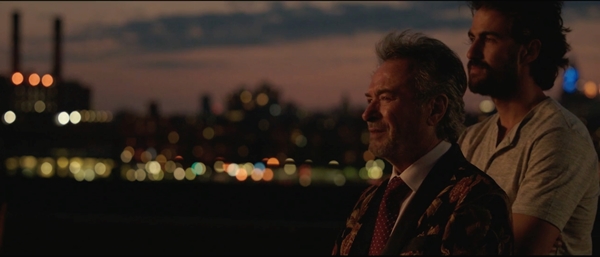
A Bolivian man in mourning, Jorge (Oscar Martínez), goes through his son’s Facebook profile and finds the chat history between Gabriel and his male lover in New York City. By accident, he pushes the video chat icon and calls Sebastian (Fernando Barbosa). The two begin arguing with each other as Jorge believes Sebastian seduced his son and turned him gay. This unexpected conversation is how Sebastian finds out that his ex-lover died shortly after leaving town to come out to his family.
Once the Skype call has ended, the film’s point of view switches to Sebastian’s as he comes to grips with Gabriel’s apparent suicide. Sebastian and Gabriel, both immigrants from Bolivia, meet when Sebastian is working at a clothing store and Gabriel comes in to buy a shirt for a job interview. Once Sebastian recognizes their Bolivian connection, he becomes excited and extends an invitation to Gabriel to a party that night. Much to Gabriel’s surprise, the rooftop party is made up completely of gay men.
Gabriel stands by himself at the ledge of the roof and tries to pretend he’s straight but “cool” with being among a predominately gay get-together. This is when Sebastian’s friend, TJ (the absolutely scene-stealing Tommy Heleringer), approaches Gabriel and gives him a speech about the seven different types of gay men. (Every group of gay friends has the one who is a little feisty and very oversexed and uses his sexual experience like it’s a PhD on gay male behavior.)
So TJ breaks down for Gabriel the variations, beginning with the closet case, and then goes through the levels of self-denial until he reaches the last category, which is not only self-acceptance but a celebration of one’s queerness, and this is the level one must reach to attain true intimacy in a relationship with another man. The way TJ describes it, he makes you want to reach for number seven: hassle free and able to fall in love. And in that moment, Gabriel decides that’s who he wants to be. If he was the first or second type of gay man before the speech, then afterwards he skips all the way to the seventh stage and enters into a relationship with Sebastian right then and there.
Back to the present: Jorge travels to New York City and shows up on Sebastian’s doorstep. In Jorge’s bereavement, he has decided that he failed Gabriel as a father. Now he wants to see for himself what his son’s gay lifestyle really looked like. Sebastian hesitantly agrees to let Jorge meet his son’s friends and discover for himself what an openly gay man’s life is like. In order to successfully simulate the life of a gay man, Sebastian tells Jorge that he must pretend to be newly out of the closet himself. Sebastian and his roommate, Alonso (Dominic Colón), are the only ones who know the truth. So Jorge gets to explore gay New York and meet new people and see for himself that his country and his religion’s ideas of homosexuality are just not true.
Writer/director Rodrigo Bellott’s Tu Me Manques handles its many heavy issues (gay suicide, homophobia, religion, and love) so adeptly that this film is an experience unlike anything else in movies right now. It’s based on the 2015 play by Bellott that was a smash hit in Bolivia. I haven’t even discussed its three time periods that jump back and forth between the past and the present-day Bolivia, where Sebastian is premiering the play based on his life with Gabriel, or that Gabriel is played by three different actors, sometimes within the same shot. All of that plays perfectly into the themes that Bellott’s play/film sets out to resolve.
Tu Me Manques is Bolivia’s entry for Best International Feature Film for the 2019 Academy Awards. Let’s hope the Academy recognizes how moving and perceptive it is.
Tu Me Mangues is the closing night film at NewFest 2019.
















Leave A Comment